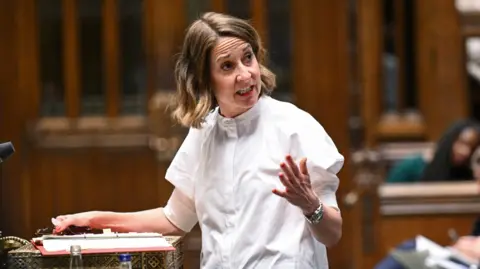Politics reporter
 Home of Commons
Home of CommonsWork and Pensions Secretary Liz Kendall has confronted repeated questions from Labour MPs over the rollout of adjustments to the profit system, as the federal government makes an attempt to defuse a backbench revolt.
As a part of a U-turn final week, the federal government mentioned stricter eligibility standards for getting the non-public independence fee (Pip) would solely apply to these claiming after November 2026, slightly than present claimants.
It additionally promised a overview into the evaluation course of in partnership with incapacity organisations, on account of be accomplished in autumn 2026.
However many Labour backbenchers questioned the rationale for making adjustments to the qualifying standards earlier than the overview was completed.
Kendall mentioned any suggestions from the overview – to be led by incapacity minister Sir Stephen Timms – can be applied “as quickly as attainable” following its completion.
She added that the Timms overview wouldn’t be “pushed by an goal of constructing financial savings” including: “It is about ensuring that this actually very important profit is truthful and match for the long run.”
Pip assessments contain questions on duties like making ready and consuming meals, washing and getting dressed. Every is scored from zero – for no problem, to 12 – for essentially the most extreme.
Underneath the federal government’s proposed system, new claimants must rating at the least 4 factors for one exercise to qualify for the profit, as an alternative of qualifying for help throughout a broad vary of duties.
Debbie Abrahams, chair of the Work and Pensions Committee, mentioned: “If that is being really co-produced with disabled folks of their organisations, the overview ought to decide each the brand new course of, the brand new factors and the brand new descriptors, and we should not predetermine it at 4 factors.”
Dame Meg Hillier – chair of the Treasury Committee – requested Kendall for “the rationale for deciding on these 4 factors in a single class previous to the Timms overview”.
One other Labour MP, Sarah Owens, requested: “What’s the logic of constructing adjustments to future claimants earlier than producing the Timms overview?”
The federal government was compelled right into a climbdown after greater than 120 Labour MPs – together with Dame Meg and Abrahams – threatened to dam the Common Credit score and Private Independence Funds Invoice.
Ministers had hoped concessions made final week had reassured MPs, though round 50 Labour MPs are nonetheless anticipated to oppose the invoice.
It will take 83 Labour backbenchers – together with the opposite opposition events – to defeat the federal government.
Talking in Parliament, Kendall mentioned she had “listened rigorously” and was “making constructive adjustments because of this”.
Because of adjustments to the invoice, no present claimant can be pushed into poverty, she mentioned.
She additionally defended the necessity for the invoice telling MPs that the federal government had inherited a system that was “failing on all fronts”.
“The welfare state should be truthful, each for many who want help and for taxpayers, so it’s sustainable for generations to come back.”
The federal government had initially estimated its plans would save round £5bn by 2030 from the rising welfare invoice. In the course of the assertion Kendall confirmed the federal government’s concessions would price £2.5bn by 2030.
Conservative shadow work and pensions secretary Helen Whately mentioned the federal government had produced a “rushed and chaotic compromise” which might save £2.5bn from a £100bn invoice.
She mentioned financial savings might be made by growing the variety of assessments carried out face-to-face and tackling the “rising claims for frequent psychological well being issues corresponding to nervousness and despair”.
Tory chief Kemi Badenoch, later confirmed her get together can be voting towards the invoice, arguing it didn’t provide “critical welfare reform”.
Liberal Democrat spokesman Steve Darling mentioned the price of the profit system was “skyrocketing” however added: “Balancing the books on the backs of the poor is wrong-headed within the excessive.”
Some MPs raised concern {that a} “two-tier” system can be created if the federal government restricted eligibility for brand spanking new claimants.
Kendall defended the transfer arguing that the advantages system “typically protects present claimants from new charges or new guidelines, as a result of lives have been constructed round that help, and it is typically very onerous for folks to regulate”.
Earlier within the day the federal government produced new modelling estimating that round 150,000 folks can be pushed into poverty by 2030 on account of the welfare cuts – decrease than the 250,000 predicted earlier than the federal government’s U-turn.
A Downing Avenue spokesman mentioned the modelling “would not mirror the complete image” and was “topic to uncertainty”.
“What it would not mirror is the broader motion we’re taking to raise folks out of poverty and lift residing requirements, particularly by means of work,” he added.


